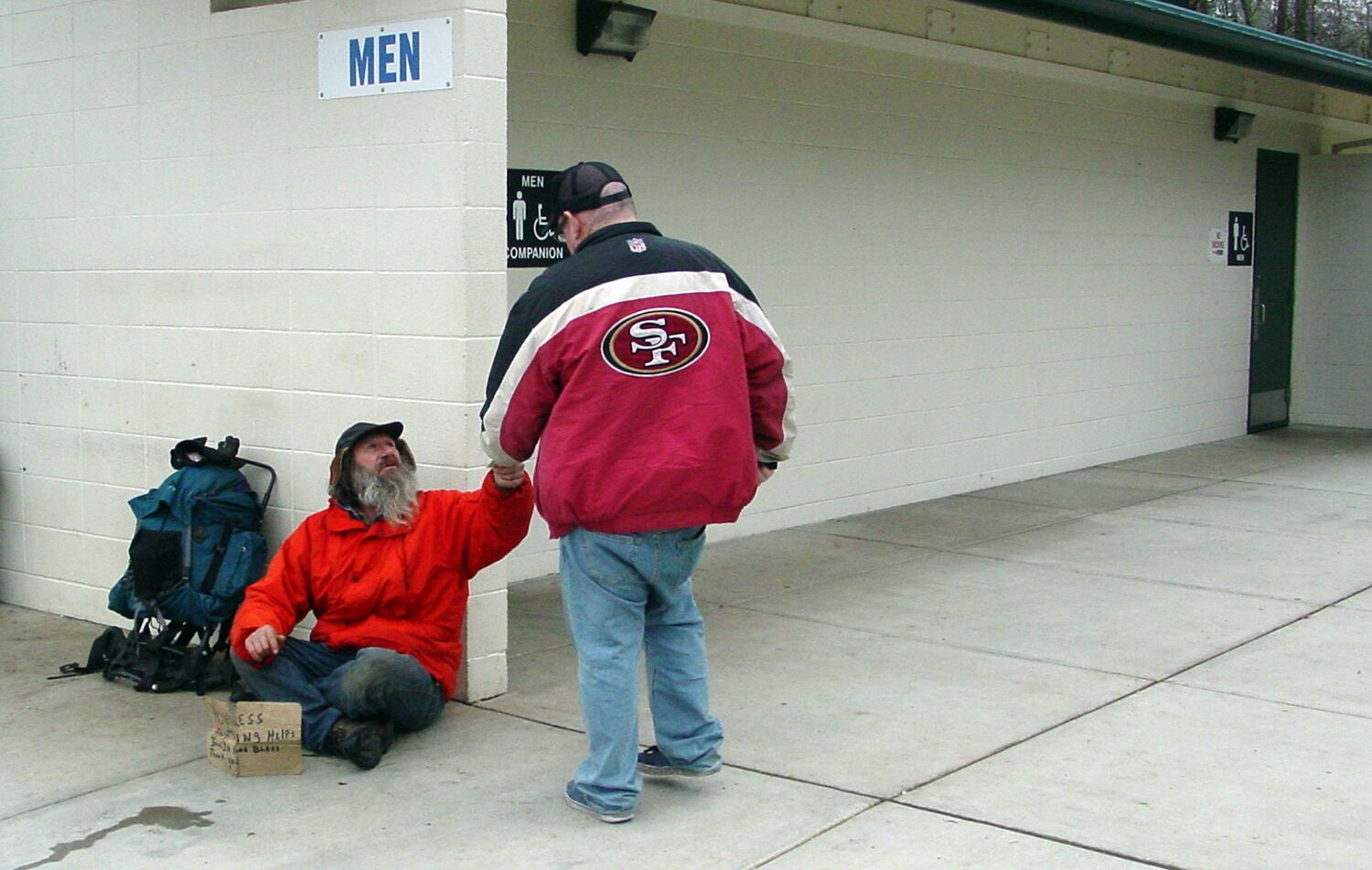Court docket upholds homeless proper to sleep exterior in Oregon case
[ad_1]

A couple of decade after dropping her job and changing into homeless within the small metropolis of Grants Move, Ore., Debra Blake joined two different homeless residents in suing the town over a set of native ordinances that, of their view, criminalized the act of sleeping exterior.
Blake and her co-plaintiffs argued that there have been no shelters the place they may keep within the metropolis of 38,000, that they’d no place else to go, and that the town’s anti-camping and anti-sleeping ordinances represented “merciless and weird punishment” in violation of their constitutional rights.
Amongst different issues, the ordinances banned using rudimentary gadgets similar to blankets and cardboard containers for cover towards the climate.
“Over the previous eight to 10 years I’ve met dozens, if not a whole lot, of homeless individuals in Grants Move,” Blake wrote in a court docket declaration in 2019, when she was 60. “They’ve all had related experiences with the Grants Move police awaking them, shifting them alongside, ticketing them, fining them, arresting them and/or criminally prosecuting them for residing exterior.”
In a choice certain to reverberate in greater cities like Los Angeles, a three-judge panel of the U.S. ninth Circuit Court docket of Appeals issued a ruling Wednesday that largely sided with Blake and her co-plaintiffs, rejecting central tenets of the Grants Move ordinances as unconstitutional and upholding a part of a decrease court docket’s choice blocking them from being enforced.
Grants Move Metropolis Atty. Augustus Ogu declined to instantly remark Wednesday, saying he was nonetheless studying the choice.
Town didn’t dispute that it didn’t have sufficient shelter beds for all of its unhoused residents.
Ed Johnson, director of litigation on the Oregon Regulation Heart, which helped characterize the plaintiffs within the case, applauded the court docket’s ruling.
“In the present day’s choice is in step with well-established precedent that it’s unconstitutionally merciless to punish homeless individuals for unavoidable acts of survival,” he mentioned. “We’re happy with the result, however not stunned.”
Homeless rights advocates mentioned the ruling additional affirmed — and in some methods expanded upon — present protections for unhoused individuals compelled to sleep exterior throughout the nation, together with in main cities with giant homeless populations similar to L.A.
“Anytime the ninth Circuit passes down a ruling about what cities can and can’t do in relation to the criminalization of homelessness, it’s going to have an effect in Southern California,” mentioned Shayla Myers, a senior lawyer on the Authorized Support Basis of Los Angeles and co-lead counsel in an ongoing lawsuit over L.A.’s observe of destroying the property of unhoused individuals throughout cleanups and sweeps.
“What the court docket is doing is saying, fairly merely, this can be a primary constitutional precept,” Myers mentioned. “You possibly can’t punish individuals for sleeping on the sidewalk, and you may’t discover loopholes to punish individuals.”
In its 2-1 choice, the appellate court docket — which covers an enormous swath of the West, together with California — reiterated one other of its selections, within the main homelessness case Martin vs. Metropolis of Boise in 2018. In that case, it dominated that the eighth Modification “prohibits the imposition of legal penalties for sitting, sleeping, or mendacity exterior on public property for homeless people who can not acquire shelter.”
However the court docket went a bit additional this time.
“Our choice reaches past Martin barely,” wrote Choose Roslyn O. Silver of the U.S. District Court docket of Arizona, a visiting choose sitting on the appellate panel who wrote its opinion.
Amongst different issues, the court docket discovered that the Martin choice’s safety of unhoused individuals’s proper to sleep outdoor once they haven’t any the place else to go “consists of sleeping with rudimentary types of safety from the weather.”
In the course of the litigation, the town of Grants Move had revised its anti-camping ordinance to permit homeless individuals to sleep in metropolis parks, however continued to ban them from utilizing sleeping baggage or different bedding supplies. Town argued the change introduced its ordinance into compliance with the Martin choice.
The court docket disagreed in its ruling Wednesday.
“The one believable studying of Martin is that it applies to the act of ‘sleeping’ in public, together with articles essential to facilitate sleep,” Silver wrote.
The court docket additionally rejected the town’s declare that its ordinances didn’t run afoul of the Martin choice — or the Structure’s merciless and weird punishment clause — as a result of they relied on civil citations for enforcement earlier than resorting to legal sanctions.
The ordinances subjected unhoused individuals to civil fines of as much as a number of hundred {dollars} per violation, and folks present in violation of the ordinances a number of instances may very well be barred from all metropolis property. As soon as barred, an individual returning to metropolis property was topic to legal prosecution for trespassing.
The court docket dominated that it was a transparent violation of the Martin ruling to topic unhoused individuals who have nowhere else to go to legal trespassing costs only for being exterior and attempting to maintain heat, whether or not civil citations got here first or not.
“Imposing a couple of further steps earlier than criminalizing the very acts Martin explicitly says can’t be criminalized doesn’t remedy the anti-camping ordinances’ Eighth Modification infirmity,” Silver wrote.
The appellate court docket’s choice upheld partially an injunction towards the enforcement of the town’s anti-camping ordinances that had been issued by a decrease district court docket.
The ruling advised the decrease court docket to “slim” its injunction to acknowledge a “restricted proper” to safety towards the weather, which it steered didn’t embody using stoves and fires or the constructing of constructions — issues the anti-camping ordinance had additionally barred.
Blake, the lead plaintiff, has since died. The appellate court docket mentioned the decrease court docket must rethink different claims related to harms she had suffered, presumably by discovering a substitute plaintiff who had suffered equally.
Silver was joined within the majority opinion by ninth Circuit Court docket Choose Ronald M. Gould. Each had been appointed by President Clinton.
In dissent, ninth Circuit Court docket Choose Daniel P. Collins, who was appointed by President Trump, mentioned the bulk’s choice was “egregiously unsuitable.”
Collins — who additionally referred to as the Martin choice “deeply flawed” however acknowledged he was sure by it — wrote that the ruling Wednesday misunderstood Martin, misapplied it, and “successfully requires the Metropolis of Grants Move to permit all however one in every of its public parks for use as homeless encampments.”
It was unclear Wednesday whether or not the ruling could be appealed.
After the ninth Circuit‘s ruling within the Martin case, metropolis officers in California and different Western states challenged it, arguing it undercut their authority to control encampments on sidewalks. The U.S. Supreme Court docket, nonetheless, refused to take up the case.
Advocates in L.A. mentioned they hoped Wednesday’s ruling would give native leaders pause about imposing related legal guidelines that displace unhoused individuals in L.A.
“Hopefully it sends a distinct message to cities and counties round how houseless individuals can get organized legally to combat again towards the criminalization of houselessness and the removing of property,” mentioned Pete White, founding father of Los Angeles Group Motion Community.
However, White mentioned, he worries that L.A. and different cities will merely recalibrate their legal guidelines to evade the ruling, simply as they’ve with previous court docket selections that landed on the facet of the unhoused.
Carl Sanchez, a 64-year-old man within the L.A. space, had related issues.
Earlier this yr, when Sanchez came upon the town was going to clear an encampment the place he was residing in San Pedro, he put up indicators on his tent that talked about the Martin choice, which he felt ought to have protected him. Shelters on the time had been full or felt unsafe, he mentioned, and he had nowhere else to go.
However the indicators didn’t assist, he mentioned. When he refused to depart, he was arrested and booked into jail, he mentioned. When he bought out, his tent, garments and drugs for hypertension had been all gone, and he slept within the chilly for 3 days.
He has since relocated to Riverside, he mentioned.
“I’m staying in a secluded space surrounded by bushes and bushes,” he mentioned. “All I’ve to fret about is the coyotes and bobcats.”

